Description of Sickle Cell Anemia
- Sickle cell anemia is a disorder of the blood that affects the synthesis of red blood cells.
- Genetic changes in hemoglobin gene is the causes of sickle cell anemia (Sahoo, 2020).
- The shape of red blood cells changes from the normal biconcave shape to the abnormal crescent moon shape.
- The change in the shape of red blood cells affects their functions of transporting oxygen in the blood vessels.
- Sickle-shaped red blood cells have a reduced capacity to carry oxygen and experience inflexible and sticky movement in the blood vessels (Yuruva et al., 2020).
- As a genetic disorder, sickle cell anemia manifests at the age of six months and gets worse with age, resulting in reduced life expectancy to 40 to 60 years.
- Treatments and management interventions improve the life span of individuals with sickle cell anemia.
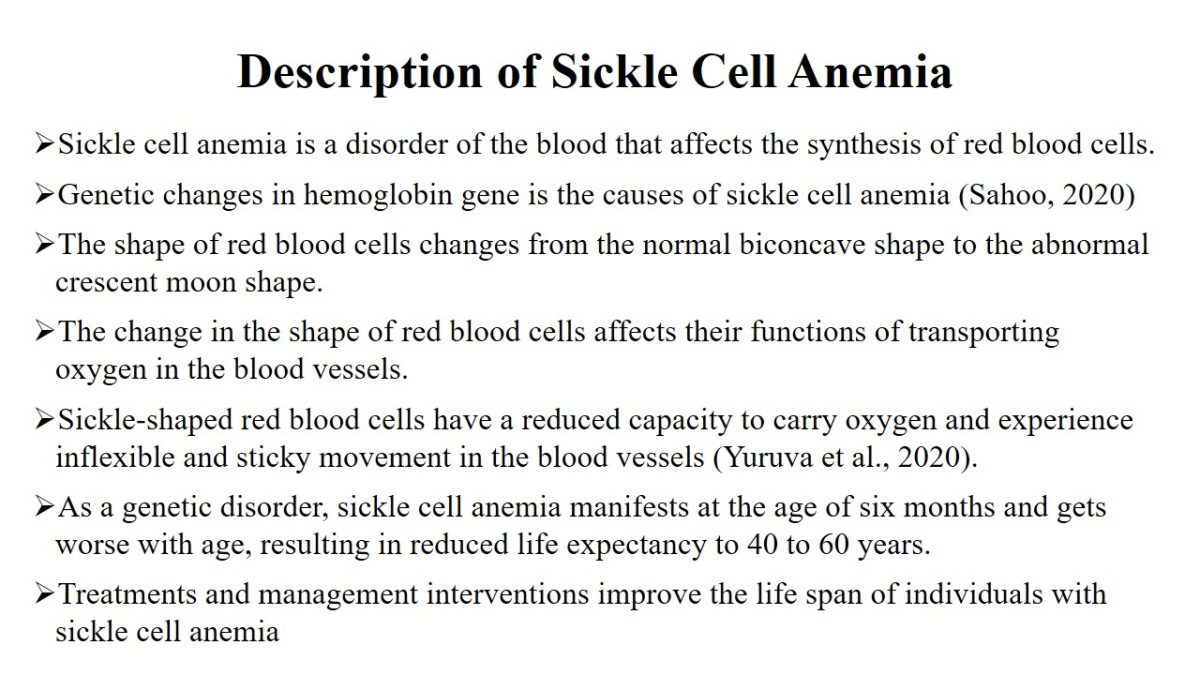
Population Affected Sickle Cell Anemia
- Across the world, sickle cell anemia is prevalent among babies, children and young adults in most countries.
- The proportions babies with sickle cell anemia is similar in males (50%) and females (50%) since the mutation occurs in somatic genes.
- The average age of diagnosis is 2 years for males and 4 years for females (Ceglie et al., 2019).
- More males experience severe crisis (68%) than females (32%) due to hormonal differences.
- The mean age of deaths of females (48 years) is higher than that of males (42 years) (Ceglie et al., 2019).
- The mortality rates varies across the age as 68% (0-3 years), 39% (4-9 years), and 24% (10-14 years) (Centers for Disease Control and Prevention, 2020).
- With poor treatment and management interventions, 50%-90% of children die before they attain the age of five (1-5 years).
- Globally, about 300,000 cases of sickle cell anemia among babies occur with 80% of them being Africans (Cisneros & Thein, 2020).
- In the United States, the healthcare system registers 100,000 cases of babies with sickle cell anemia, with major occurrences among African Americans (0.3%) followed by American Hispanics (0.006%), while Asians and Indians have minimal proportions of less than 0.001% (Centers for Disease Control and Prevention, 2020).
- About 8% of African-American babies have sickle cell trait (Centers for Disease Control and Prevention, 2020).
- In Africa, the prevalence of sickle cell trait among babies is between 10% and 45%, with the highest rates in Nigeria of the disease (2-3%).
- The analysis of the distribution shows that sickle cell anemia is common in tropical regions, such as Middle East, sub-Saharan, and Asia, where malaria is endemic.
- Projections indicate that migration would increase the prevalence of sickle cell anemia to about 14 million cases by 2050.
- People who live in malaria endemic regions are susceptible to sickle cell anemia because homozygous trait do not have adaptive advantage.
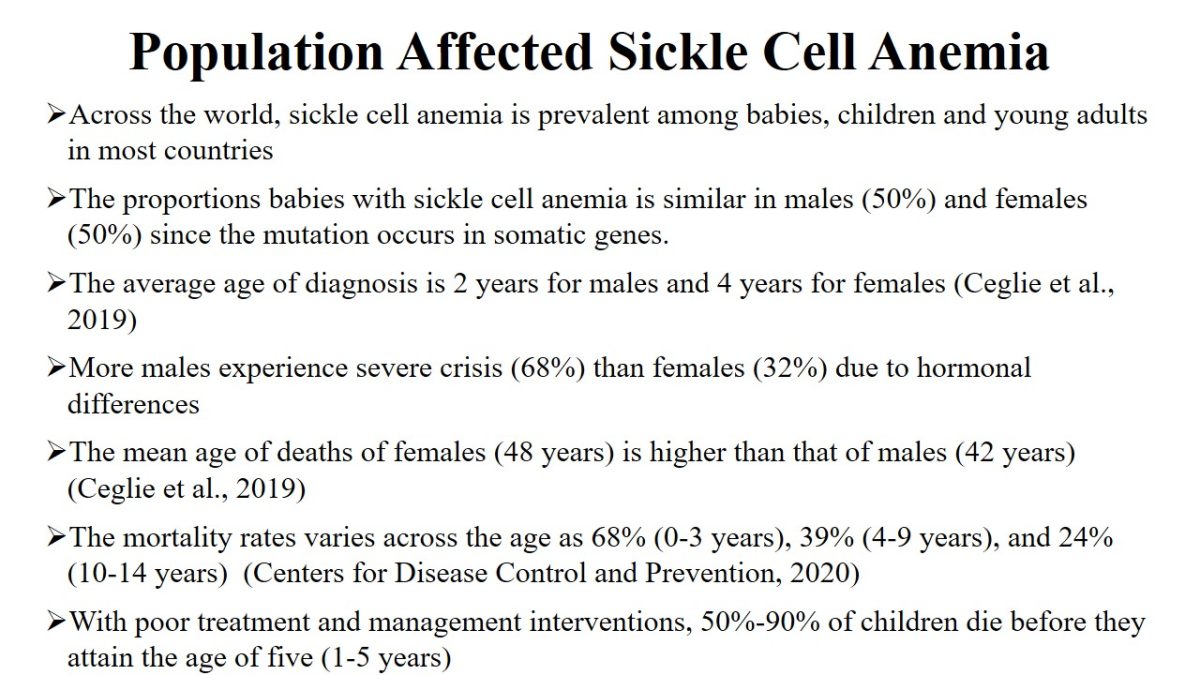
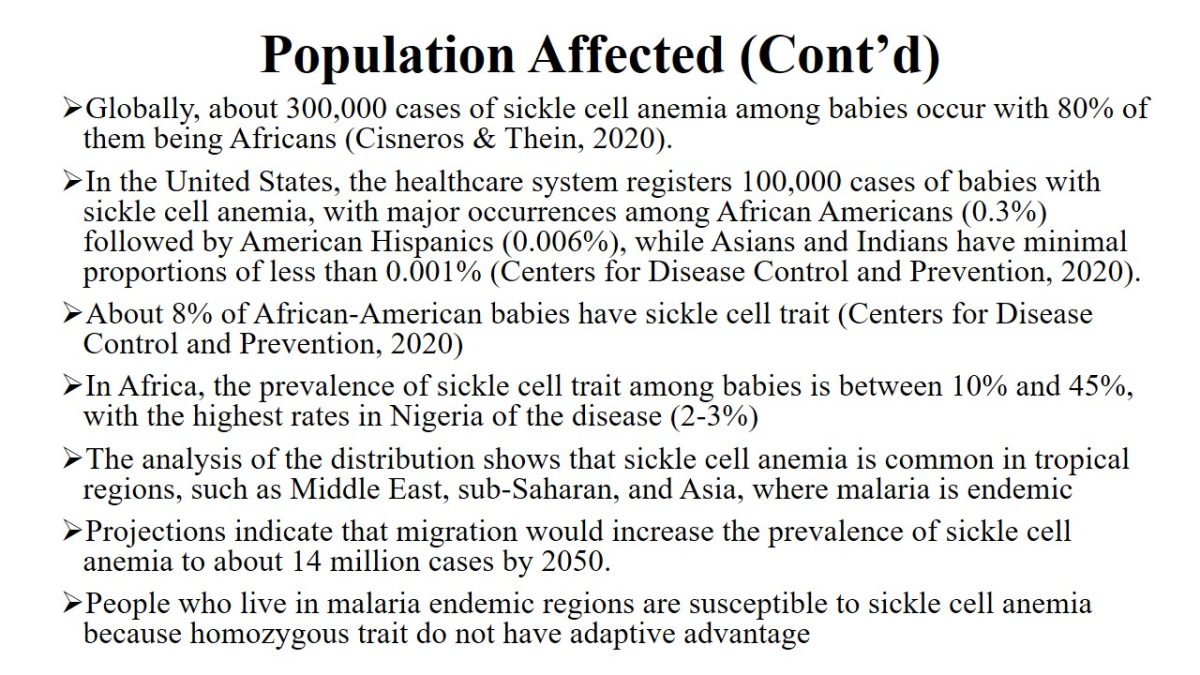
Causes of Sickle Cell Anemia
- A genetic change is the cause of sickle cell anemia among individuals. A single nucleotide substitution that changes the codon from GAG to GUG at the sixth position causes sickle cell anemia (Sahoo, 2020).
- This form of substitution arises on the coding sequence of the beta-hemoglobin chain situated in the short arm of chromosome 11.
- The resulting change in an amino acid is the substitution of glutamate in the acidic class, with valine in the aliphatic class (E6V).
- The coded protein by the mutated gene polymerizes and triggers changes in red blood cell shape from a biconcave into a crescent conformation (Cisneros & Thein, 2020).
- The inheritance of the mutant gene from parents follows the autosomal recessive pattern.

Signs and Symptoms of Sickle Cell Anemia
- Signs and symptoms of sickle cell anemia become evident during childhood and present diverse acute and chronic problems, which vary from one person to another.
- Sickle cell crisis characterized by acute anemia is one of the major signs and symptoms of sickle cell anemia.
- A vaso-occlusive crisis occurs due to obstruction of capillaries, resulting in pain, necrosis, and ischemia (Meier et al., 2018).
- Splenomegaly originates from the sequestration of red blood cells in the spleen and obstructed capillaries. Fever, chest pain, and pulmonary infiltrate contribute to acute chest syndrome (Sahoo, 2020).
- Fatigue, high heart rate, and pallor stem from aplastic crisis and anemic conditions, which affects uptake and distribution of oxygen in tissues
- Ultimately, a hemolytic crisis happens due to the affected synthesis of red blood cells.

Body Parts Affected by Sickle Cell Anemia
- The primary part of the body affected by sickle cell anemia is the blood tissue, particularly the red blood cells.
- Since red blood cells play a key role in the transportation of oxygen in the body, sickle cell anemia reduces the capacity and respiration rate in tissues (Sahoo, 2020).
- Sickle cell anemia also affects the efficiency of the circulatory system due to the obstruction and slow flow of blood in the body by the abnormal cells.
- Since ischemic stroke is one of the consequences of sickle cell anemia, it stems from obstructed supply of blood to the brain (Yuruva et al., 2020).
- A restricted circulation of blood resists the lungs and causes pulmonary hypertension.
- Liver and spleen are affected due to sequestration of red blood cells and hemolytic crisis in the metabolic processes.
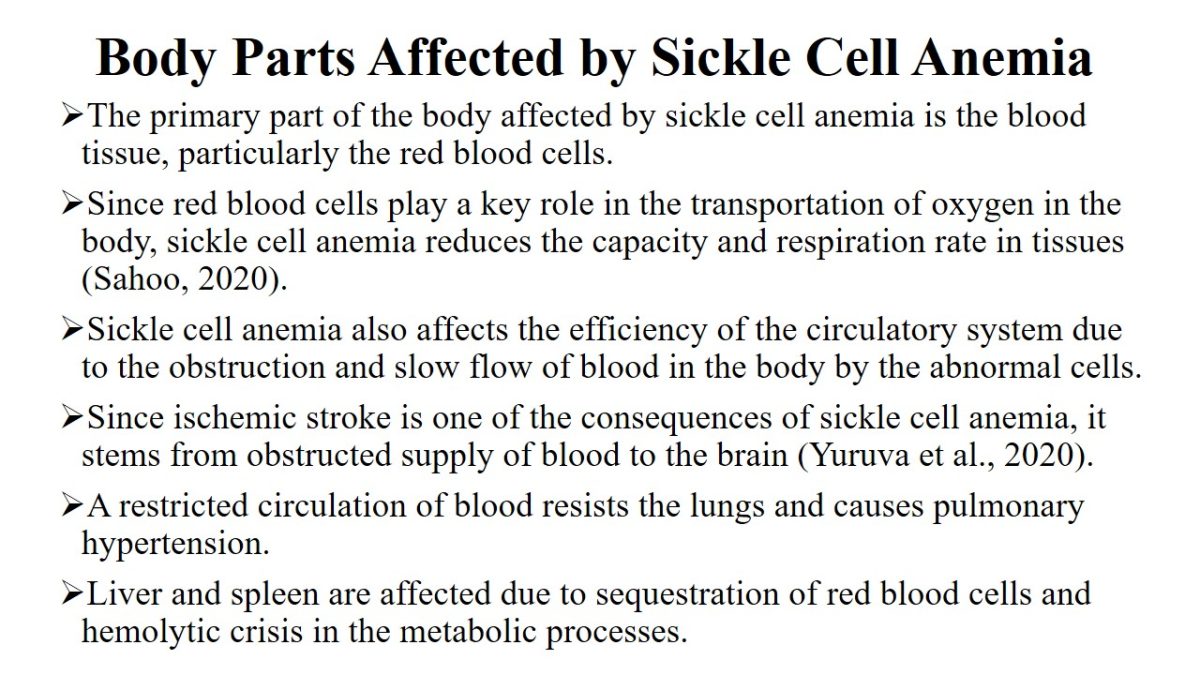
What is Used to Diagnose Sickle Cell Anemia
- Numerous methods are effective in the diagnosis of sickle cell anemia among individuals across ages.
- A complete blood count checks the level of hemoglobin if lower than the normal level (Sahoo, 2020).
- Moreover, this method also evaluates if reticulocytes are higher than normal threshold.
- Sickle solubility test using sodium metabisulfite to differentiate hemoglobin S from A by the formation of a precipitate due to polymerization of sickle-shaped red blood cells (Meier et al., 2018).
- High-performance liquid chromatography identifies different forms of hemoglobin, such as A, F, S, C, D, and E (Sahoo, 2020).
- Hemoglobin electrophoresis and isoelectric focusing are two methods commonly used to diagnose sickle cell anemia (Sahoo 2).
- Genetic screening to establish the existence of mutation in the hemoglobin gene is done on a fetus, baby, or adult (Yuruva et al., 2020).
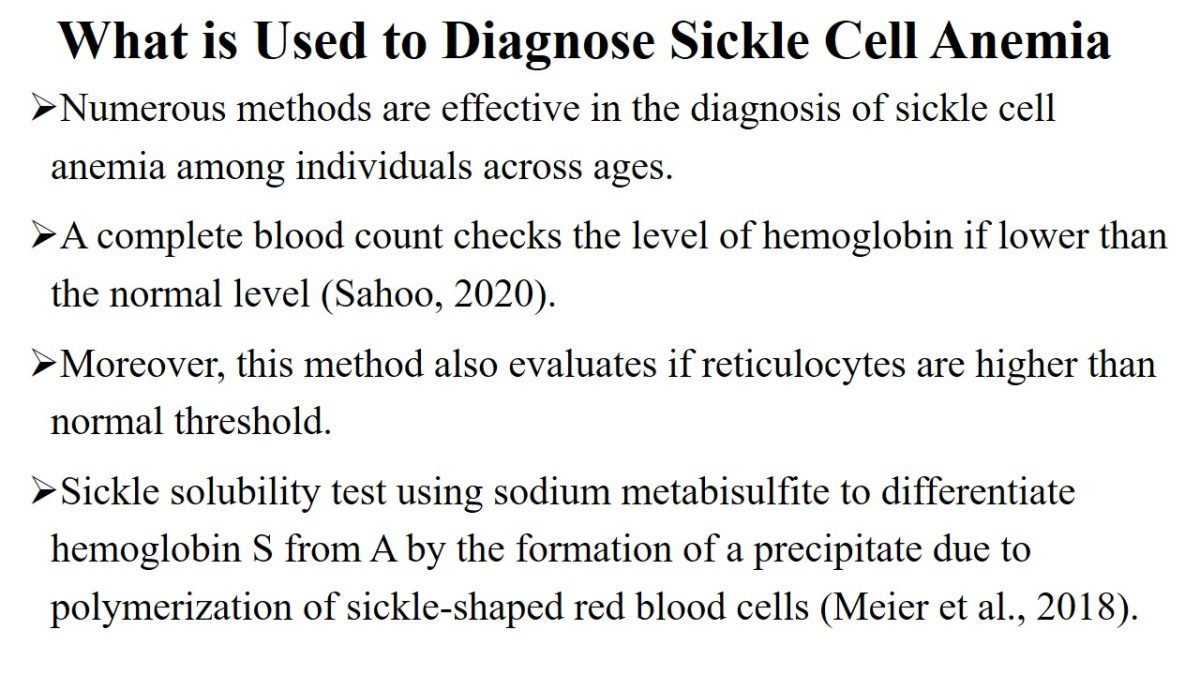
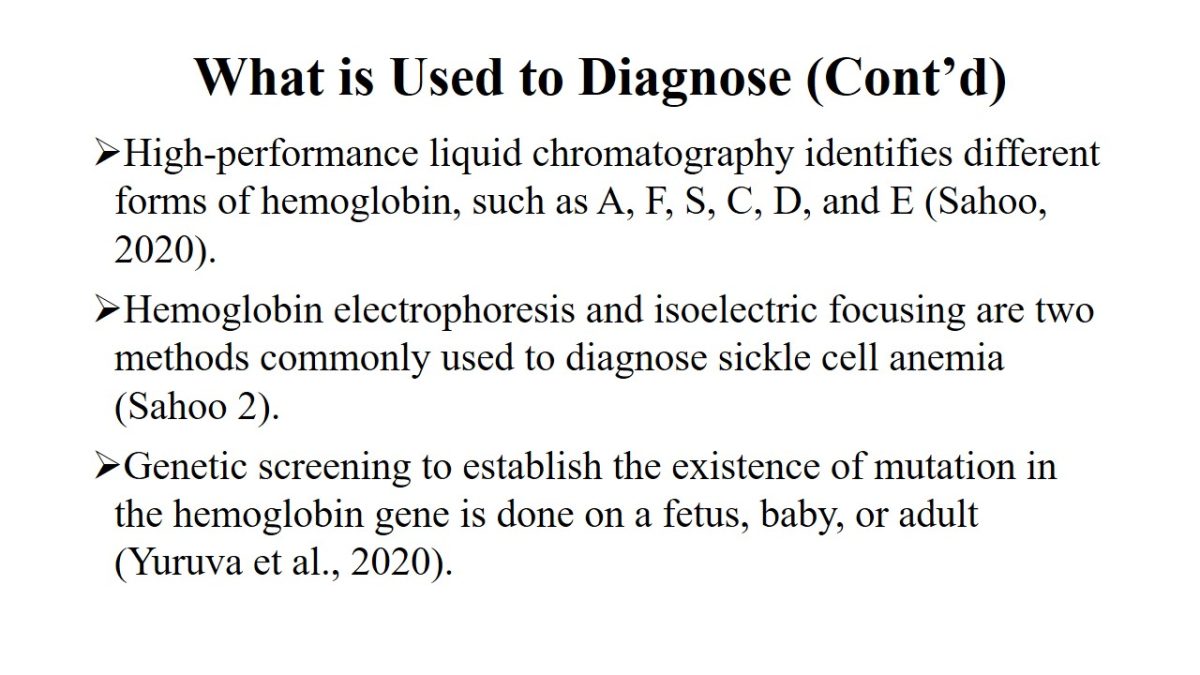
How Diagnosis is Made
- The procedure of diagnosis varies according to the sample used and the age of individuals.
- For unborn babies, genetic screening is effective in the diagnosis of sickle cell anemia because it identifies mutations (Meier et al., 2018).
- A doctor removes a sample of amniotic fluid from a pregnant woman and uses it in genetic screening.
- The procedure entails the isolation of genomic DNA, amplification of the hemoglobin gene, and sequencing to identify substitution at the sixth codon position (Sahoo, 2020).
- In adults, a sample of blood is subjected to high-performance liquid chromatography.
- High-performance liquid chromatography differentiates different forms of hemoglobin in red blood cells (Sahoo, 2020).
- The analysis of chromatogram peaks would reveal the type of hemoglobin in blood.
- Red blood cells with sickle cell anemia would show a chromatogram peak of hemoglobin S.
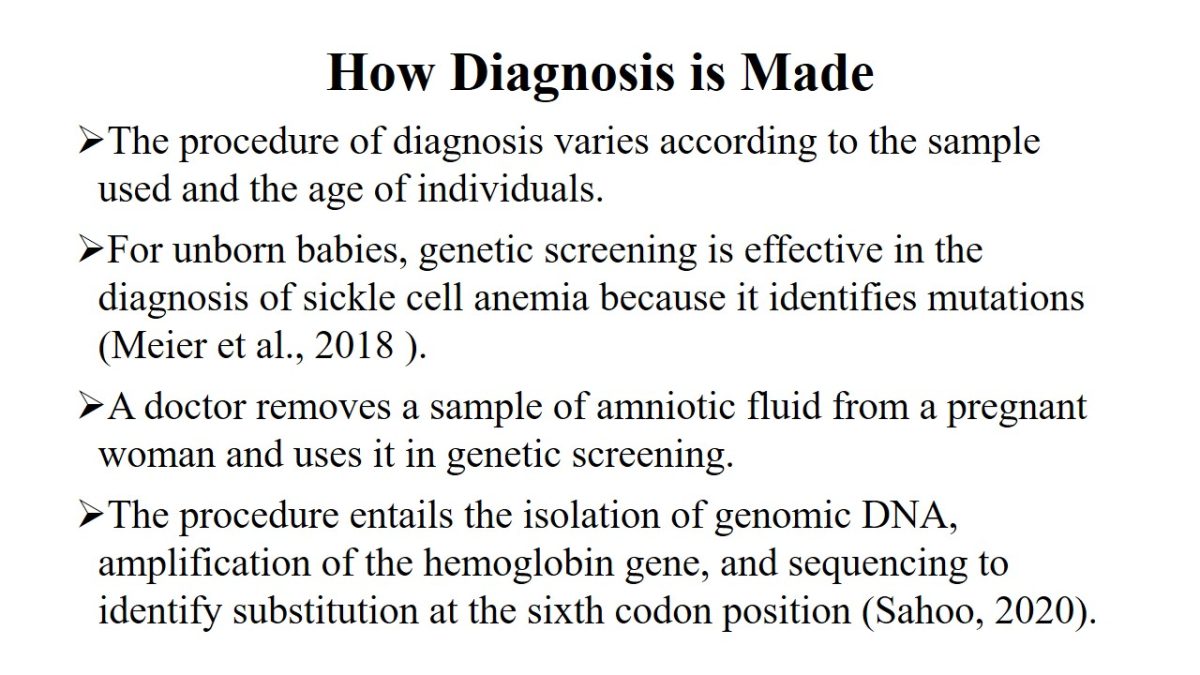
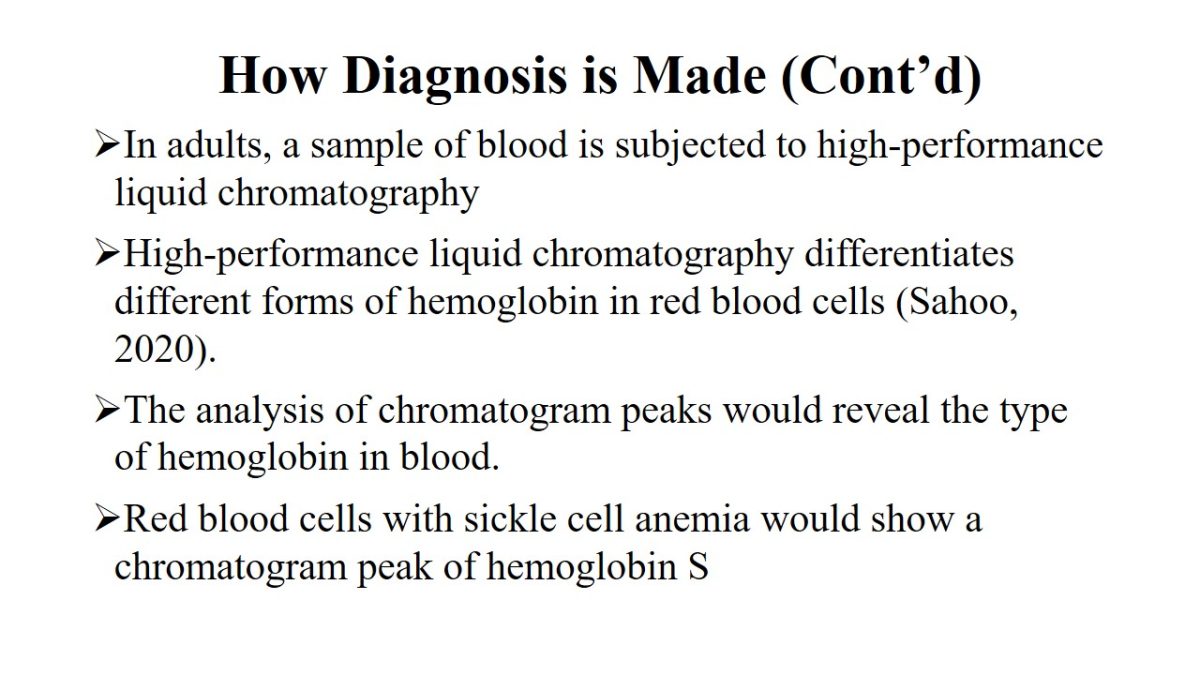
Treatment for Sickle Cell Anemia
- Chemotherapy is one of the effective treatments of sickle cell anemia.
- Some medications are folic acid to boost hemoglobin level, analgesics to relieve pain, penicillin to prevent pneumonia, and malaria prophylaxis to reduce susceptibility (Provenzano et al., 2018).
- Patients with chronic symptoms require administration of hydroxyurea to stimulate fetal hemoglobin and prevent vaso-occlusive crisis (Sahoo, 2020).
- Blood transfusion is necessary to increase hemoglobin level in severe anemia, prevent stroke, and alleviate acute chest syndrome (Provenzano et al., 2018).
- Gene therapy using CRISPR-Cas9, gamma-globin gene transfer, lentivirus short hairpin RNA, lentiglobin bb305, and bone marrow transplant are effective in the modification of hemoglobin genotypes to correct the target mutation (Cisneros & Thein, 2020).
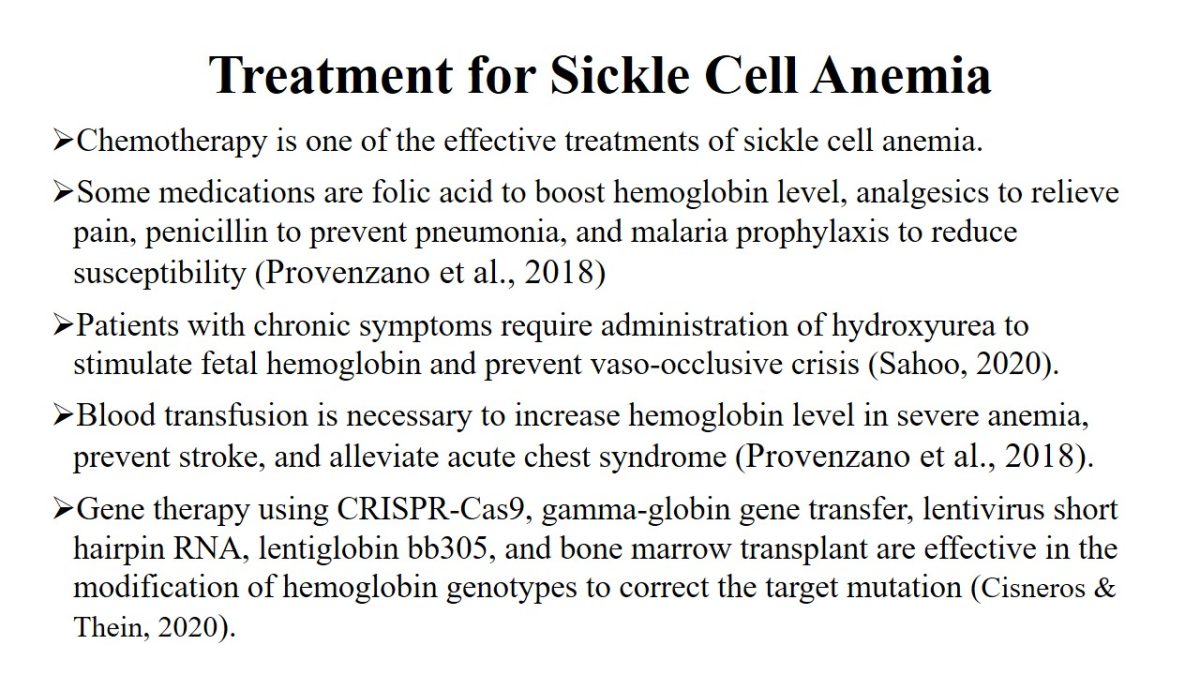
Interesting Facts: Prognosis
- The efficacy of treatment varies from one person to another and according to treatment and management interventions.
- Approximately 90% of people with sickle cell anemia attain the age of 20 years (Meier et al., 2018).
- Moreover, over 50% of patients survive beyond 50 years when provided with appropriate treatment (Provenzano et al., 2018).
- The expected life span of people with sickle cell anemia is between 40 and 60 years (Yaruva et al., 2020).
- However, advancements in treatments, such as gene editing and bone marrow transplantation, offer a promising cure for sickle cell anemia.
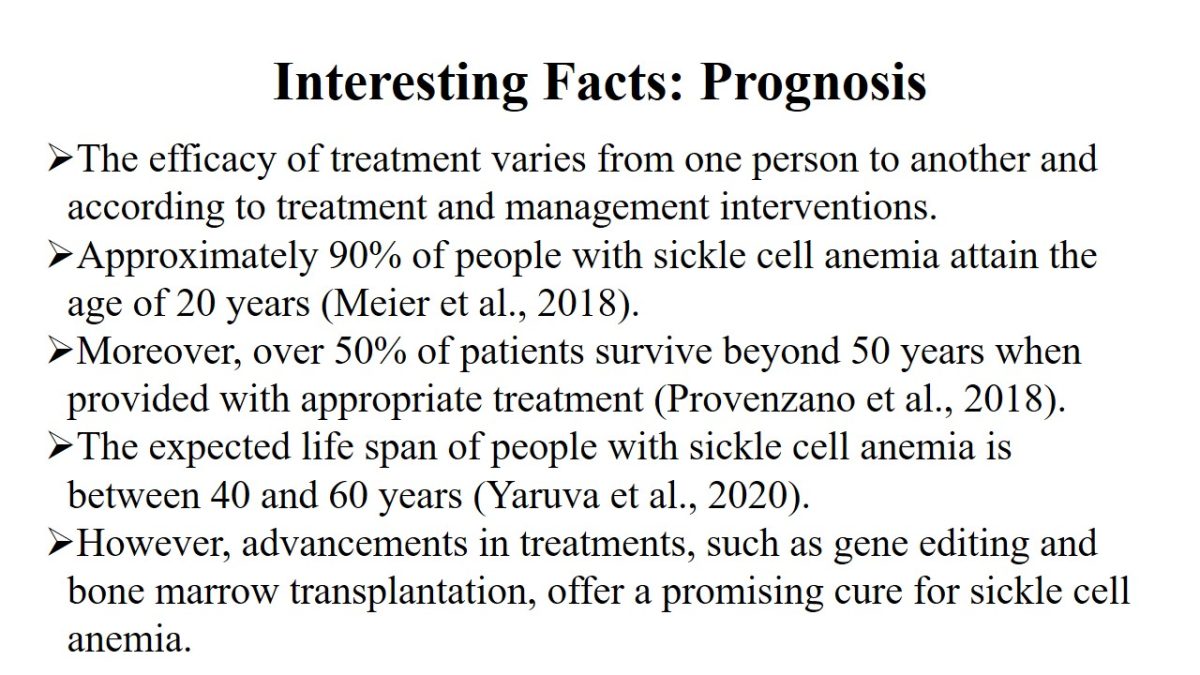
Historic Importance of Sickle Cell Anemia
- The history of sickle cell anemia dates back to 1910 when doctors discovered it in the United States and Africa and abbreviated it as SCD.
- Ernest Edwards Irons observed red blood cells and become the first person to describe them as having sickle-shaped cells (Yuruva et al., 2020).
- In 1952, doctors in India discovered it among people who lived in the Deccan plateau (Yuruva et al., 2020).
- In the late 21st century, the prevalence of sickle cell anemia was high among African Americans with a mortality rate of 1.5%.
- Sickle cell anemia was prevalent in tropical regions, namely, the Mediterranean region, sub-Saharan Africa, the Middle Eastern region, and India, where malaria was endemic due to adaptive advantages (Cisneros & Thein, 2020).
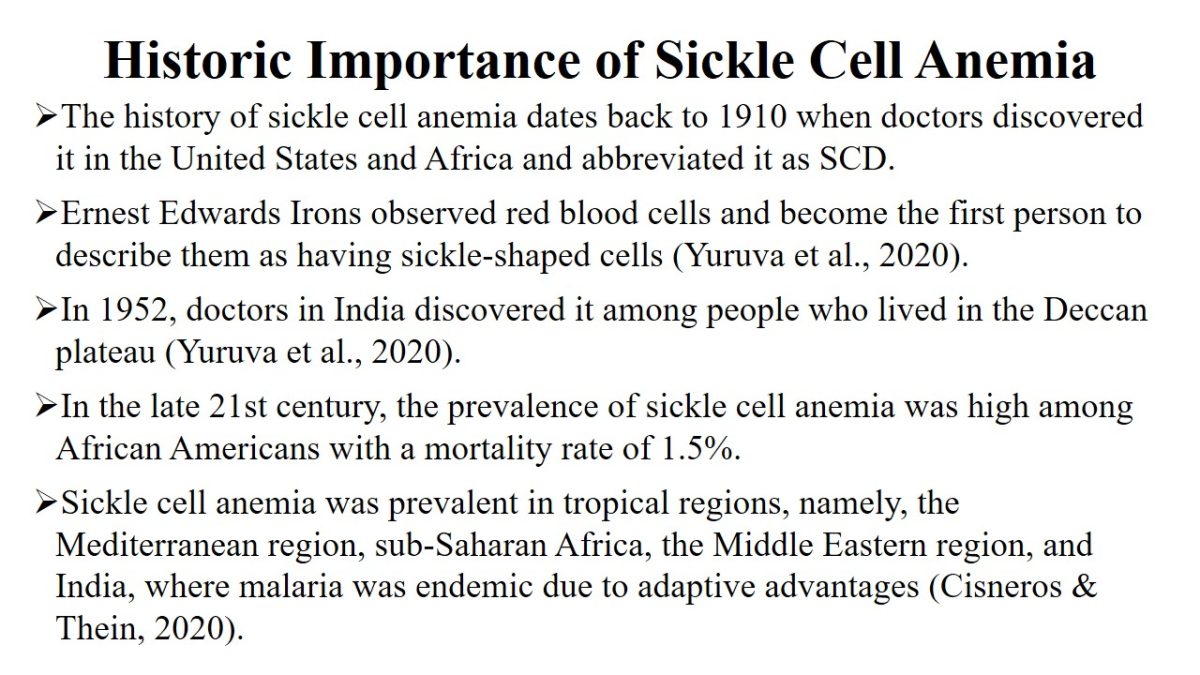
References
Ceglie, G., Di Mauro, M., Tarissi De Jacobis, I., de Gennaro, F., Quaranta, M., Baronci, C., Villani, A., & Palumbo, G. (2019). Gender-related differences in sickle cell disease in a pediatric cohort: A single-center retrospective study. Frontiers in Molecular Biosciences, 6(1), 1-5. Web.
Centers for Disease Prevention and Control. (2020). Data and statistics on sickle cell disease. CDC. Web.
Cisneros, G. S., & Thein, S. L. (2020). Recent advances in the treatment of sickle cell disease. Frontiers in Physiology, 11(1), 1-15. Web.
Meier, E. M., Abraham, A., & Fasano, R. M. (2018). Sickle cell disease and hematopoietic stem cell transplantation. Springer.
Provenzano, R., Lerma, E. V., & Szczech, L. (2018). Management of anemia: A comprehensive guide for clinicians. Springer.
Sahoo, S. R. (2020). Sickle cell anemia: A brief synopsis. Journal of Genetic Syndromes and Gene Therapy, 11(2), 1-2. Web.
Yeruva, S., Varalakshmi, M. S., Gowtham, B. P., Chandana, Y. H., & Prasad, P. E. (2020). Sickle cell disease: A comprehensive study and usage of technology for diagnosis. International Blood Research and Reviews, 11(2), 6-14. Web.